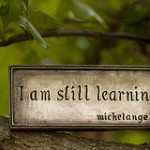Glen Allsopp, blog master of the website “ViperChill,” argued that continual innovation is necessary to stay responsive. I would argue that his sage advice applies not only to blog viability, but to life in general. This summer (instead of teaching), I devoted my time to regrouping and getting my instructional house in order.
This included a total revamp of my Principles of Management course, to include an integrated chapter/main concept/exercise workbook, a system of individual student mentors, and an electronic interface (which will allow students to ask questions in real time). Examples from the masters were necessary for me to accomplish this goal. Excellent sources included Barbara Millis, Joseph Raelin, Harvey Brightman, and Ken Bain.
The effort entailed upfront costs, but one that going forward will only require updates. This repository will save instructor class prep time, prevent student confusion, and optimize course shell organization (because everything is now in one tidy place as opposed to scattered across several PowerPoint files). In addition, I’m experimenting with overhauling classroom management by making students an integral part of the learning process. The redesign will include:
- MBO: Students will be required to meet with the professor twice per term to ascertain goal progress toward their “Personal Success Plan.” This exercise will provide real world experience in Management by Objectives. In these sessions the professor will ask students: (1) What is it I’m doing that you find helpful, and that you would like for me to continue?; and (2) What is it that you find hurtful that you would like for me to stop?
- Suggestion Box. The D2L Course Shell will contain a “Suggestion Box” (with an anonymous posting option) in which students can indicate suggested course improvements. Specifically, they will respond to the following questions: (1) What do you consider to be the problem? (2) How does it hinder learning? (3) What is your suggested solution? (4) How would you as the manager address this?
- Co-determination Council: Communications Directors from each team will form a “Codetermination Council” that will meet with the professor weekly to discuss team preferences regarding class content, structure, and activities. Meeting outcomes will be recorded in a Quality Improvement Plan, designed to be a “living” document amended throughout the course term.
- Civility Policy: Co-determination members will formulate a “Civility Policy,” which will (1) define civil classroom behavior; (2) outline expected class conduct; and (3) create sanctions for non-compliance.
Through materials overhaul and inclusion of behavioral expectations, class has been restructured to a cooperative learning experience, a democratic form of governance in which both students and the instructor engage in reciprocal teaching.
On a personal note, I’ve chosen to expand my horizons through an MTSU non-credit degree program. Writer’s Loft pairs individuals with an established writer in the genre of their choice (e.g., screenplay writing, poetry, fiction, short story, and non-fiction). The process of learning about craft while simultaneously producing a viable product has been challenging (to say the least), but increasingly fun as I find myself “getting the hang of it.”
Stretching from our comfort zones forces us to learn. Golden suggests new activities which require novel thinking grow dendrites, strengthening our mind, and our ability to make connections; enhancing “computational ability” and brain circuitry. Accordingly, “All of life should be a learning experience.” Activities suggested by the San Diego Brain Injury Foundation include puzzles, playing a musical instrument, fixing something, dancing, sailboat racing, chess, and bridge.
We’ve never too old to learn. The “youthfulness” it promotes may be well worth the effort.
______________________________________________
Related References
MERLOT Pedagogy: Cooperative/Collaborative Learning
The Jigsaw method
Cooperative Learning for Higher Education (Millis & Cottrell)
Creating Leaderful Organizations: How to Bring out Leadership in Everyone (Raelin)
What the Best College Teachers do (Bain)





Recent Comments